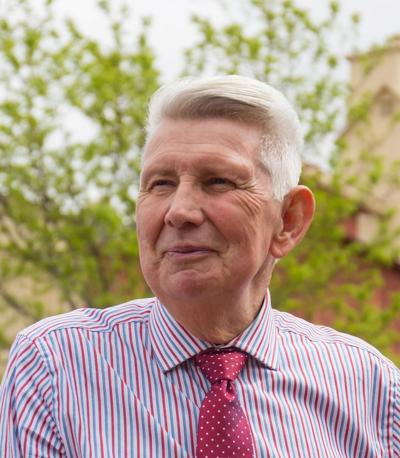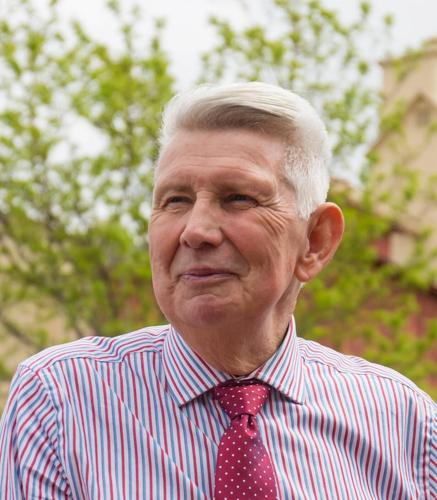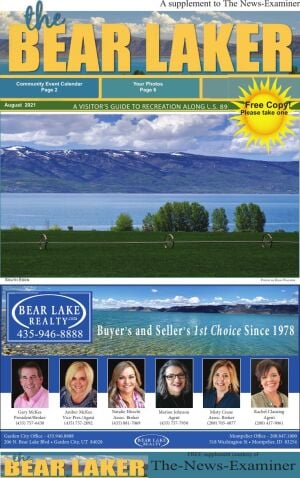As a taxpayer, I say “hooray” to eliminating waste, fraud and abuse. As a father, grandfather and former political official in a state that balances its budget every year, I abhor the fact that our nearly $37 trillion dollar deficit increases by an additional $1 million every twenty seconds. It is long past time that we put our national fiscal house in order.
However, I do dissent from the President’s May 1 Executive Order entitled “Ending Taxpayer Subsidization of Biased Media.” Directed at the Corporation for Public Broadcasting, it also impacts the Public Broadcasting Service, its local affiliate Idaho Public Television, and some 350 sister stations through the Country.
Together, the television system entertains, informs and educates approximately 100 million PBS watchers a month, with untold more millions who stream on the PBS website and mobile apps. Its cultural and historical programming are unmatched and very broad-based. Demographic studies indicate such watchers are more likely to be highly educated, white-collar professionals than the audience viewing other forms of public media. Yet, PBS also reaches into 89% of America’s lower-income family homes. Eighty five percent of polled parents believe that PBS KIDS is the most trusted and safe source of educational programming for children. As compared to commercial broadcasters, cable television and social media, in a nationwide survey, the PBS network ranks as the most trusted communication network in the Country. It regularly informs and entertains, week in and week out, a third of the American people. In Idaho, some 60% of households and 830,000 viewers regularly watch Idaho Public Television. That amounts to between 6 and 8 million program views monthly.
The President’s Executive Order terminates the approximately half a billion dollars of federal funding given to the Corporation for Public for pass through to NPR and PBS, upon the conviction that “Government funding of news media is outdated and unnecessary” and is also “corrosive to the appearance of journalistic independence.” Mr. Trump alleges that the CPB violates the mandate of law that it may not “contribute to or otherwise support a political party” when neither NPR nor PBS presents “a fair, accurate or unbiased portrayal of current events.”
Seventy percent of the CBP federal funding of the $535 million passes through to local TV and radio stations so that can support local content production and educational services specific to their communities. In the instance of Idaho Public Television, with five stations throughout the State, that amounts to about $2 million this year, or 17% of its local total funding. However, Idaho PTV broadcasts only ten current event and news hours per week. Most of those, such as Idaho Reports, are deliberately balanced, objective and locally produced. Thus, the President can hardly label Idaho PTV as an offensive, rogue and politically-biased news outlet. Other local public television stations around the Nation take a similar approach.
However, the President has a more legitimate concern of bias about the NPR network. The public radio group refused to cover the Hunter Biden laptop story, labeling it a distraction. NPR insisted that COVID-19 did not originate in a lab and would not cover any alternative theory. Of course, the PBS flagship news show is also not above criticism. A recent analysis indicated, that it offered congressional Republicans 85% negative coverage, compared to 54% positive coverage for Democrat members. The presidents of both NPR and PBS helped the cause of neither when they gave weak defenses against obvious examples of broadcast partiality on March 26th at a hearing before the House DOGE Subcommittee. In fact, the hearing was billed as addressing “Anti-America Airwaves.”
Thus, the President is correct that “No media outlet has a Constitutional right to taxpayer subsidized operations.” So can PBS, in this era of needed financial retrenchment, legitimately earn and give good value back to the taxpayers for the many millions of hard-earned dollars which it currently receives each year?
My answer is “Yes.” It is a valuable American asset. In these decisive, complicated, acrimonious and threatening times when 85% of the American public lacks significant confidence in all media outlets, we need a “safe place” on T.V. The most legitimate role for PBS should be to promote viewer “attainment,” not just “entertainment.” Public television programming, properly focused, can encourage and involve every American of every age, location, race, ethnicity and economic strata to do and to be and to see! How? Why?
Let’s eliminate the Corporation for Public Broadcasting and have Congress deal directly with NPR and PBS. At current funding levels, that saves $160 million, reducing the budget thereby.
PBS, as does Idaho PTV already, needs to honestly and faithfully recommit to political neutrality and toe the line. If necessary to negotiate continued funding, PBS could forego or negotiate different formats for the current national news and commentary shows, leaving that genre mostly to the commercial and podcast stations.
The member stations and national organization for public television must even further ramp up their historical, cultural and social programming to attempt to encourage a centered, patriotic, well-motivated, informed and positive American citizenry, avoiding polarization, eschewing divisiveness. We have always needed a national storyteller and certainly do now.
In all formats and programs which admit of a right and left or liberal and conservative set of views, such as historic documentaries for instance, PBS should utilize the old fashioned principle, which was a hard rule of journalism in the 1960’s, 70’s and even 80’s, of balance by including “equal time” comments in the same program from every and all points of view. Equal time with equal emphasis is both defensible and informative.
In political seasons, PBS and its local affiliates should eagerly accept the role in national, congressional, state and local political races, of fostering a well informed citizenry. Let’s make debates fashionable again, by creating, promoting and insisting, if possible, on widespread participation by all candidates in public shows and one-on-one sessions. The moderators should be strictly objective and demonstrably neutral.
Former radio host Rush Limbaugh warned against the “low information voter” as being a threat to democracy. PBS can become a useful antidote to the dark money advertising on the web or paid media that today tends to distort and derail political understanding. A Pew Research Center survey just conducted in March 2025 confirmed that twice as many Americans still support continued federal funding for both NPR and PBS, as oppose it. By building upon that trust and assuming the role of neutral and inclusive election-season political presenter, PBS can help rebuild the support which it still enjoys at modest cost to the national budget.
Founding Father Thomas Jefferson opined that a “nation never was and will never be” both “ignorant and free”. The Freedom of the Press to help facilitate accurate public perception remains the cornerstone of the American Republic and the key to its perpetuation. Properly run, PBS can both strengthen our national character and begin to rebut the American-era of public misinformation. Our national story needs both a storyteller and a re-imagination for these contentious times. Idaho Public Television is an excellent example of that model and delivers far more than $2 million in federal taxpayer benefits back to its viewers each year. Let’s make the national PBS network more like Idaho PTV. We still need the American storyteller.














(0) comments
Welcome to the discussion.
Log In
We welcome comments, however there are some guidelines:
Keep it Clean: Please avoid obscene, vulgar, lewd, racist or sexual language. Don't Threaten: Threats of harming another person will not be tolerated. Be Truthful: Don't lie about anyone or anything. Be Nice: No racism, sexism or any sort of -ism that is degrading. Be Proactive: Report abusive posts and don’t engage with trolls. Share with Us: Tell us your personal accounts and the history behind articles.